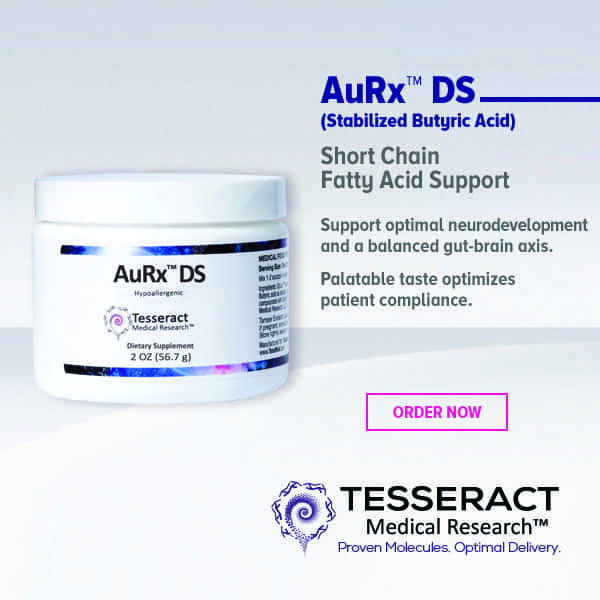Article Summary:
- In the absence of a curative treatment, many researchers, patients and caretakers turn to homeopathy in an attempt to alleviate symptoms of autism spectrum disorder
- Despite some promising early research and plentiful anecdotal evidence, there is a lack of strong empirical support for the use of homeopathic treatments
- While future research may clarify the potential role of homeopathy in the treatment of autism, patients and caretakers may want to explore research-backed natural alternatives, such as butyric acid supplementation
Within the scientific and clinical communities, homeopathy has been a part of the conversation around autism spectrum disorder (ASD) treatment options for years. Nearly two decades ago, autism researchers and clinical practitioners began assessing whether low doses of secretin could reduce symptoms of autism. Today, there is anecdotal and limited empirical evidence that a variety of homeopathic remedies—combined with secretin or not—may ameliorate a broad spectrum of symptoms for patients with autism and other neurological disorders. As a result, parents and clinicians looking to address symptoms that have not been alleviated by conventional interventions continue to consider homeopathy as a potential treatment strategy. However, they may be better served by seeking out more effective natural alternatives.
What is Homeopathy?
From the outset, the conversation about autism and homeopathy has been highly contentious, in part because of the very nature of homeopathy itself. Homeopathy, an alternative medicine practice that was first developed in Germany at the end of the 18th century, is based on two key theoretical principles. The first principle is that diseases can be cured by introducing substances that produce symptoms similar to the condition from which the patient is suffering in order to stimulate the body’s innate healing abilities. Put more simply, practitioners believe that “like cures like.” The second principle is that introducing certain substances in minute doses can have outsized effects. In fact, homeopathic remedies are often diluted to the point where the substances being introduced are virtually undetectable.Although the principles of homeopathy may seem similar to those of vaccination, it is important to note that there is no relationship. Vaccines introduce small doses of a disease-causing substance in order to “train” the immune system to recognize a disease and mount an immune response upon future exposure. With homeopathy, the idea is that introducing a diluted version of a symptom-causing substance will directly cure the existing condition.
Mechanistically, homeopathy is not backed by solid scientific principles, but it remains highly appealing to parents with children who have autism. As an all-natural remedy, it can seem like a great option for those who have not seen complete resolution of symptoms with conventional treatments or who want to avoid conventional pharmaceutical options altogether. Given this high level of interest coupled with widespread anecdotal evidence of efficacy, some researchers have attempted to find empirical evidence supporting the use of homeopathic treatments for autism.
The First Wave of Interest in Autism and Homeopathy
The potential for homeopathy to treat symptoms of autism first gained widespread attention in the early 2000s in response to a series of well-publicized anecdotes. Specifically, clinicians and parents were reporting that the introduction of secretin, a gastrointestinal hormone, could improve symptoms of autism, particularly symptoms related to social behaviors and speech communication. There were also reported improvements in gastrointestinal symptoms associated with autism.
The scientific principle behind the proposal that secretin could aid in the treatment of autism was the “opioid excess theory,” which posits autism as a metabolic disorder. According to proponents of this theory, some symptoms of autism—particularly those related to social and language skills—are associated with high levels of peptides that have opioid activity in the brain. The primary role of secretin is to regulate the release of substances in the gastrointestinal tract, but some evidence suggests that the presence of secretin can lower the levels of these peptides. As a result, homeopathic secretin treatment could potentially improve neurological functioning in patients with autism and thereby alleviate related symptoms.
In response to anecdotal success stories, there was a flurry of activity within the scientific community as researchers sought to investigate whether the efficacy of secretin treatment could be empirically verified. However, the results were mixed, leaving many clinicians at a loss for how to advise patients and families. There was no statistically significant evidence for the efficacy of secretin as a treatment method, but there were multiple clinical trials in which some parents reported positive benefits or an individual patient showed marked improvements. It is important to note that only a few of the clinical trials that were conducted introduced secretin at homeopathic levels—that is, in extremely low doses. However, the results of those that did were the same as the others. The findings provided strong anecdotal evidence for the efficacy of homeopathic secretin treatment, along with promising—but inconclusive—statistical results.
With no clear direction for future research, the scientific community turned away from studies on homeopathy and autism. A systematic literature review paper from 2014 revealed that 2005 was the last time a rigorous clinical trial examining the relationship between autism and homeopathy of any kind was published in a major medical journal.
Ongoing Discussions of the Value of Homeopathic Medicine for Autism Patients
The loss of widespread research interest in homeopathic treatments for autism was surprising because these treatments never lost traction in the clinical community. Many clinicians and parents around the world continue to report benefits when applying the principles of homeopathic medicine to patients with autism, both in combination with and in place of conventional treatments. However, while some clinicians still use homeopathic levels of secretin to treat autism, the conversation has now shifted away from secretin to more multidimensional homeopathic treatment approaches.
Today’s most popular homeopathic treatments use low levels of multiple substances to address a broad range of symptoms, and the exact combination of remedies is tailored to the needs of the patient. Some of the homeopathic substances that are reported to aid in the treatment of autism include Stramonium, Tarentula hispanica, Calcarea carbonica, Natrum muriaticum, and Carcinosinum. Although there are currently no major research studies examining the efficacy of these remedies, a small 2014 study on 60 children with autism found that they produced statistically significant improvements of multiple autism symptoms, including hyperactivity/restlessness, sensory impairment, eye contact, and speech communication.
The Future of Research on Autism and Homeopathy
When it comes to autism and homeopathy, significant questions still remain. The widely circulated anecdotal evidence that holistic homeopathic therapies can be used to successfully treat symptoms of autism is exciting to many parents and patients. However, rigorous clinical trials that offer more definitive evidence of efficacy must be conducted in order to better understand these therapies—including the mechanisms through which they operate and the types of patients that they are most likely to help—and to create meaningful treatment protocols.The motivation to pursue additional rigorous research on homeopathy and autism may be bolstered by positive results from recent research on the efficacy of homeopathic treatments for other neurological disorders, such as Attention Deficit Hyperactivity Disorder (ADHD). For instance, in a comparative consecutive case series of thirty children with ADHD from 2016, researchers in the UK reported statistically significant improvements in those who received individualized homeopathic therapy from a trained homeopath, as compared to those who received conventional treatments. The researchers noted that there were broad symptom improvements in the patients with a concomitant diagnosis of autism spectrum disorder. Studies like this one could provide impetus for more rigorous research on homeopathy and autism in the future.
Despite small studies indicating potential efficacy, there is currently a significant gap between between empirical evidence and lived experience. As researchers attempt to fill this gap, we may gain greater insight into the value of homeopathic remedies in clinical settings and make more informed treatment decisions to ensure better outcomes. In the meantime, those who are seeking better symptom relief than they have achieved via conventional therapies may want to explore natural alternatives, such as butyric acid, which is readily available in supplement form.
Works Cited
Barvalia P. (2011). Autism Spectrum Disorder: Holistic homeopathy. Materia Medica and Cases. 24:31-38. http://www.somethingtosayproductions.com/wp-content/uploads/2013/01/Links-2011-part1-Barvalia.pdf
Barvalia PM, Oza PM, Daftary AD, Patil SP, Agarwal V, et al. (2014). Effectiveness of homeopathic therapeutics in the management of childhood autism disorder. Indian Journal of Research in Homeopathy. 8(3):147-59. http://www.ijrh.org/article.asp?issn=0974-7168;year=2014;volume=8;issue=3;spage=147;epage=159;aulast=Barvalia
Filbert P, Relton C, Heirs M, Bowden D. (2016). A comparative consecutive case series of 20 children with a diagnosis of ADHD receiving homeopathic treatment, compared with 10 children receiving usual care. Homeopathy, 105(2):194-201. https://www.ncbi.nlm.nih.gov/pubmed/27211327
Harrison, J. (2002). Current treatments in autism: Examining scientific evidence and clinical implications. Journal of Neuroscience Nursing. 34(2). http://journals.lww.com/jnnonline/Abstract/2002/04000/Current_Treatments_in_Autism__Examining_Scientific.5.aspx
Patel NC, Yeh JY, Shepherd MD, Crimson ML. (2002). Secretin treatment for autistic disorder: A critical analysis. Pharmacotherapy: The Journal of Human Pharmacology and Drug Therapy. 22(7):905-14. http://onlinelibrary.wiley.com/doi/10.1592/phco.22.11.905.33622/abstract
Robinson TW. (2001). Homeopathic secretin in autism: A clinical pilot study. The British Homeopathic Journal. 90(2):86-91. https://www.ncbi.nlm.nih.gov/pubmed/11341462
Shaddel F., Ghazirad M, Bryant M. (2014). What is the best available evidence for using homeopathy in patients with intellectual disabilities? Iranian Journal of Pediatrics. 24(4):339-44. https://www.ncbi.nlm.nih.gov/pubmed/25755852









